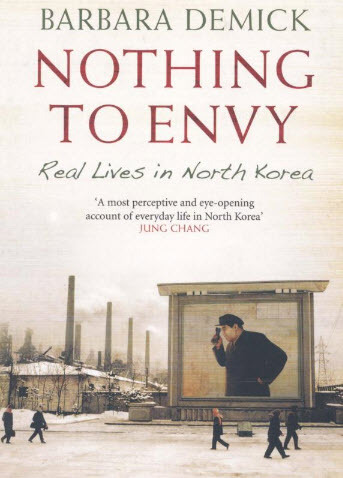Barbara Demick’s curiosity about the lives of people in North Korea, which she calls the most repressive regime on earth, led to this remarkable book, a finalist for the National Book Award in 2010. Her reporting exposes everyday life in a totalitarian state almost unimaginable to Americans. It’s nonfiction, but it reads like a novel.
Once the sun sets, the people of North Korea live in darkness, because the electrical grid failed years ago. Without being able to read or watch television, they spend their evenings sitting in the dark. A stunning satellite photograph of the entire Korean peninsula by night shows a totally black area to the north, the size of England, contrasted with a brilliantly illuminated southern part, where the normal activities of modern life go on.
Rather than generalize, the author picked half a dozen ordinary citizens, varying in age, education, gender and family circumstances, to interview. All six eventually defected, at great risk, and told their life stories to the author in the safety of South Korea.
It took a great deal of courage to defect. These people were told from childhood how great and wonderful the glorious leader Kim Il-sung was. As schoolchildren they sang songs of allegiance to their loving and benevolent leader. The title of the book comes from the continually stated message that those privileged to live under such a great society have “nothing to envy” from other forms of government.
Informers are everywhere. Designated neighbors have the responsibility of reporting any deviance from loyalty. Even mild criticism brings sentencing to a labor camp. Chances for acceptance into the Workers Party, a goal for the loyal, are squashed, as are prospects of studying at the best universities or marrying into a desirable family.Yet these six people gradually realized the truth about the regime, and determined to leave.They were all from the same city in North Korea and the author could corroborate their stories. They were fortunate, as many thousands of North Koreans did not survive years of devastating famine.
One especially endearing story is that of the boy and girl who were attracted to one another as teenagers. Since the government disapproves of public affection, this couple could only take long walks after dark when they could talk frankly about their lives in privacy. It was years before they even held hands, and more years before he even kissed her cheek. Yet this young man’s love persevered even after the girl defected, leaving the country without telling him due to fear of detection. When they meet years later in South Korea, their life circumstances have changed but the depth of their earlier feelings is obvious. The author is skillful in getting at the deepest emotions of her various subjects in challenging circumstances.
Babara Demick is bureau chief in the Beijing office of the Los Angeles Times.









